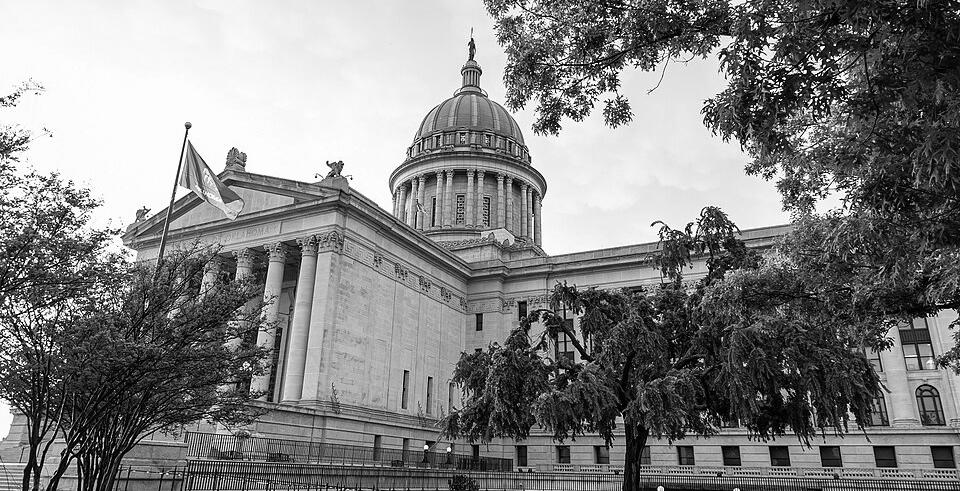Introduction
The Oklahoma Legislature adjourned on May 31, concluding the first biennial session. During this session, 3,273 were introduced and 499 became law. Many bills were enacted without Governor Kevin Stitt’s (R) signature. Governor Stitt issued a record 68 vetoes, with the Legislature desperately working in the final hours to overturn them.
Here’s what you may have missed:
Tax Cuts
Governor Stitt has been leading a campaign to reduce the state income tax to zero. During his State of the State address, he emphasized the need for the Legislature to reduce the state individual and income tax by half a point. He called for what he called a half and a path, “A half-point cut to the individual and business income tax and a path to zero income tax.”
HB 2764, introduced by Representative Trey Caldwell (R), reduced the state’s top income tax from 4.75% to 4.5% starting in 2026. While this is not the half-point Governor Stitt wished for, the bill provides a path towards his zero-income tax goal by reducing the top income tax by 0.25% on an annual basis.
While Republican leadership praised this bill as “common-sense changes,” Democrats saw it as a staging ground for financial challenges. Representative Michelle McCane (D) said most families will not see the potential benefits of the reduction, pointing to less funding for state services, infrastructure, and healthcare as state revenues decrease. Senator Julia Kirt (D) said it was the worst bill during the 2025 Legislative Session. The bill was signed on May 28.
Tax cuts have been common across Republican-led legislatures. Missouri passed legislation excluding capital gains from income taxes. Kentucky, Mississippi, and Kansas all passed legislation reducing income taxes.
Bell-to-Bell Cell Phone Ban
The Oklahoma Legislature hopped on the bipartisan trend of banning cell phones in schools from “bell-to-bell”.
SB 139, introduced by Senator Ally Seifried (R), requires school districts to implement a ban on student cell phone usage for the 2025-26 school year. From 2026 onwards, the ban is optional. The bill excludes school-issued or approved devices that may be used in classrooms for educational purposes.
This legislative trend has been supported by governors, legislators, and unions who argue that the use of personal cell phones in classrooms increases bullying and distraction. Upon signing the bill, Governor Stitt said, “We want kids to be focused and present while they’re with their teachers, and this legislation helps promote an environment conducive to learning.”
Oklahoma has joined 26 other states in requiring a school district to establish cell-phone ban policies. Florida, Louisiana, South Carolina, and Utah have implemented statewide restrictions.
Budget
The Oklahoma Legislature is required to pass a balanced budget. This year’s budget is valued at $12.6 billion. Specific provisions include funding for:
- School activities, textbooks, and instructional materials at public schools
- The Oklahoma Center for the Advancement of Science and Technology
- Critical infrastructure
- Infrastructure such as roads, bridges, and hospitals
Conclusion
The 2025 Legislative Session was one of the most active in Oklahoma’s history. Governor Stitt saw most of his priorities enacted by the Legislature, but the number of vetoes was troubling for the Legislature and the Attorney General. Of the 68 bills vetoed by Governor Stitt, 49 were overturned. Governor Stitt's reasoning for many of the vetoed bills was that they are bad for taxpayers.
Cracks may be forming in Oklahoma’s Republican party. Governor Stitt called on voters to “vote out liberal Republicans” in reference to legislators who voted to overturn his vetoes. The Legislature’s Freedom Caucus stood by Governor Stitt’s side and refused to vote yes on most of the overturns.
State legislative elections occur every two years in Oklahoma. The next election in Oklahoma will occur in 2026. The Governor, Attorney General, and all legislative seats will be up for election.
Legislation in Oklahoma carries over from odd to even years. The Legislature may take up carried-over legislation, including bills related to energy siting, sports betting, and groundwater practices. The 2026 Legislative Session is scheduled to begin February 2, 2026.
Oklahoma has an active interim through the assignment of studies. Such studies include energy siting, data center energy and land usage, SNAP, parental bill of rights, sports betting, prenatal and infant healthcare practices, property taxes, and economic development.
